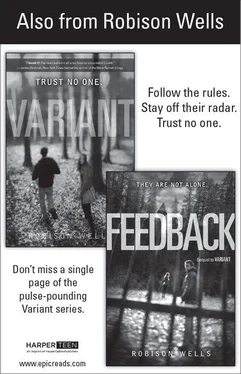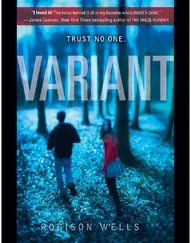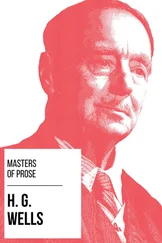There was no point in hiding it now. Nicole had obviously explained part of it, and Aubrey had no chance of escaping anyway. So she laid it all out.
Dr. Eastman listened carefully. He took the occasional note, but mostly he just watched her.
“Can I ask you a question?” Aubrey said after she’d explained everything she knew.
“Sure,” he said. “I don’t know if I can answer it.”
“How did you find me? The soldiers in the hall couldn’t see me—only the person on the radio.”
He smiled, and leaned back in his chair. “You were right about one thing when you described your invisibility. It’s not a physical power: you don’t bend light or turn transparent. Your brain tells my brain that you’re not here. In a way, it’s a form of mind control.”
“That’s what I assumed. But I still don’t see how you found me.”
“Because your brain only projects that message to people nearby. We’ll need to do tests to see how far it projects, and what kind of barriers it can go through, but suffice it to say: the team watching security monitors was too far away, and to them it looked like you were right there. Same thing with the helicopters outside—they kept thinking they saw you, but as soon as they’d get close your brain would erase you from them.”
It took a minute to sink in. That wasn’t something she and Nicole had ever tested.
“You’re a lucky girl,” Dr. Eastman said. “We were getting a sniper into position to take you down before you entered the building. You got out of his line of sight before he could take the shot.”
“I could have been dead.”
“Many times over,” he said, his voice lighter than the subject should require. “But think of it this way: you should have been shot a hundred times during the last fifteen hours. Any normal person would have been. They wouldn’t have even escaped the quarantine zone, let alone gotten all the way down in this building and then evaded capture for hours.”
He smiled a cold, curious grin. “Aubrey Parsons, you are remarkable.”
She didn’t know what to say. If she was remarkable she would have achieved something. “So,” he said, “the big question—the final question—is this: Why did you do it?”
Aubrey paused, not because she thought lying would do her any good, but because she didn’t want to get anyone else involved in her problems.
“This is very important,” Dr. Eastman urged.
“I promised Jack I’d get him out,” she finally said. “I didn’t know he was Positive.”
“Why was it important to get him out?”
“I thought that was the last question.”
“One more.”
She sighed. “Because we all thought you’d be dissecting the Positives in here. That’s why I faked my test result. You know—military testing, dissection, like in the movies. I thought he was a Negative, and I wanted to save him.”
Dr. Eastman nodded, and stood up.
“So?” she asked.
“Good answers,” he said. “We’ll be in touch.”
JACK FINISHED THE TEST, FILLINGin the last bubble on the scan sheet.
The room was filled with the chalky, rough sound of graphite on paper, of the repetitive and heightened heartbeats of the kids around him, of the deep, jagged breaths Matt kept taking, the tap of Nicole’s fingernails on her desk as she thought.
He closed his eyes, and he could see them all. Every scratching pencil was like a GPS marker. He knew the exact direction of each one, the exact distance. It was like he was looking down on the room like a sheet of graph paper, and he could plot every student on it.
At least he wasn’t throwing up anymore. For a while that was all he could do. Eating so much as a piece of bread was a nauseating assault. He tasted everything, every tiny bit of improperly mixed flour, all the mold spores that were lurking inside, not even visible yet. Even water was a disgusting slime of minerals and oils.
He could hear everything. He could taste everything. He could see everything.
He could control it better all the time; he could focus his concentration on something—staring at the cinder-block wall and counting the dimples in its texture, or looking at his fingerprints as if they were under a microscope—and that helped to block out the unwanted senses. At least now he could sit in a room with other people and not get a headache from the noise. He could have the lights on without feeling blinded.
They’d moved him to a nice dorm room, with a real bed and a dresser and a lamp. It reminded him of going to the department store: rows of bedroom sets of all different styles. This entire facility seemed to have been constructed in the last few weeks; he wondered if the army had raided an Ikea to build the dorms.
“Pencils down,” the man in the suit said. He didn’t appear to be military. Was he FBI? A doctor? They’d gone through three tests already today: one that checked basic school stuff, math and science and reading, one that was more about problem solving, and now this third one was an endless true-or-false personality test: “At times I feel like swearing,” “I think I would like the work of a librarian,” “I am sure I get a raw deal from life.” Five hundred sixty-seven statements like that. When Jack finished and laid his pencil on the desk, his brain felt like mud.
As the man walked up and down the rows of desks, he seemed nervous, like he hated being so close to the kids. Jack wanted to jump, just to make him flinch. But really, Jack was one of the people in the room who couldn’t hurt anyone. He could just watch and listen and smell and taste.
And touch—ugh. No blankets were soft enough for him. Everything felt like sandpaper.
With the sheaf of questionnaires in his arms, the man turned back to the group.
“You’ll be meeting with me in the next few days to discuss the results of these tests.” Then he turned and left.
“Can’t wait,” said Josi, just as the door closed.
“What a wuss,” another boy said. “He acted like we were going to light him on fire. Can anyone in here do that?”
Several people laughed. Everyone knew what their abilities were now, and they were slowly getting used to them.
“Jack,” Matt called out from across the room, as Jack climbed back onto his bed. “Did you notice anything? Any Sherlock Holmes action to explain what that was all about?”
Matt asked Jack that after almost every person came in the room, but Jack never knew what he was supposed to be looking for.
“Deodorant, cologne,” Jack answered. “He had dandruff and looked like he bit his fingernails. Maybe if I was smarter I could put all of that together into a brilliant psychological profile.”
“I saw something,” Josi said.
Josi had one of the few powers in the group that Jack envied. A sort of photographic memory, combined with instant comprehension. It sounded like the kind of thing that would come in handy during a math class back home.
Everyone perked up. Josi had become a sort of de facto leader.
“We’ve all been classified,” she said. “I saw it on his paperwork as he was going through our names.”
“What do you mean, classified ?” someone asked.
“The army—or the government, or whoever—has categorized us all according to our usefulness,” Josi said.
“Usefulness for what?” Matt asked, sitting on top of his desk. He didn’t sound pleased.
“Military use. They have a rating system to show how beneficial we’d be if we were in the army.”
“What the hell?” a girl said. “I’m fifteen years old.”
Josi shrugged. “I’m just saying what I saw.”
Jack called out, “So what is it? What are we?”
Читать дальше












